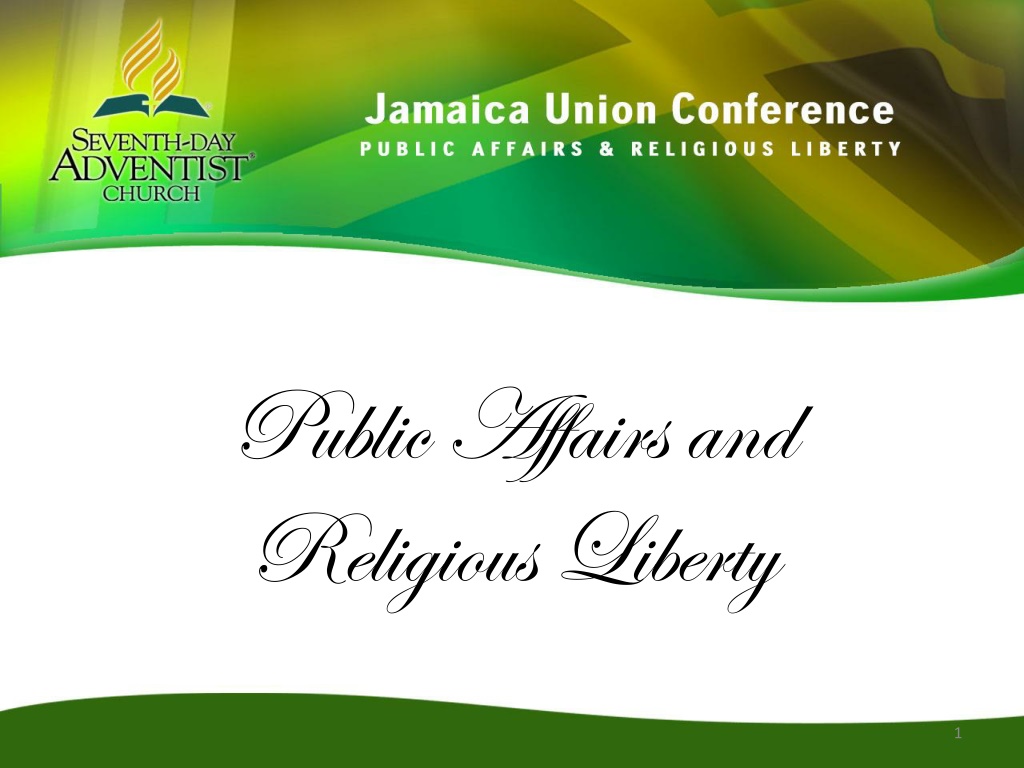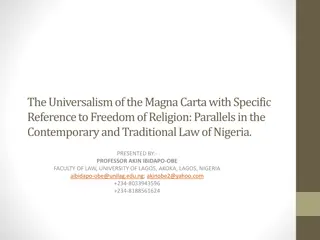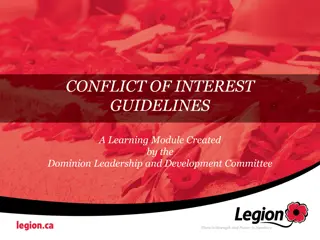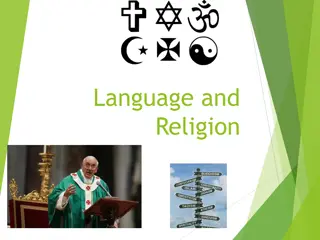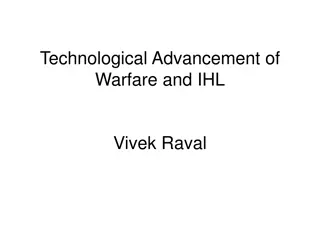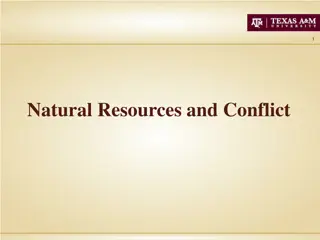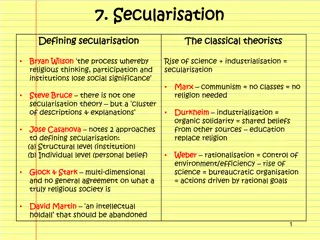Religious Conflicts Throughout History
Religion, while promoting peace and tolerance, has also been a source of conflict leading to numerous wars and significant loss of life. This article highlights some of the most notable religious conflicts, including the Crusades, the Lebanese Civil War, and the Sudanese Civil Wars. These conflicts, fueled by differences in beliefs and power struggles, serve as stark reminders of the devastating consequences of religious discord.
Download Presentation

Please find below an Image/Link to download the presentation.
The content on the website is provided AS IS for your information and personal use only. It may not be sold, licensed, or shared on other websites without obtaining consent from the author. Download presentation by click this link. If you encounter any issues during the download, it is possible that the publisher has removed the file from their server.
E N D
Presentation Transcript
Public Affairs and Religious Liberty 1
Religious Conflicts Religion is the most sensitive issue and although every religion encourages the idea of peace and tolerance, almost no one remains in peace or tolerates anything when it comes to their religion. History is full of religious wars and some of them have continued for years and killed many. that were fought over religious conflicts and differences. 2
10 Largest Religious Wars 10. Second War of Kappel Religious conflicts between Catholic cantons and Protestants. Second War Of Keppel was fought in 1531 in the land of Switzerland 700 died 3
9. Lebanese Civil War Fought between Sunnis and Shiites at the land of Lebanon between 1975-1990. Both sides belong to different ethnic groups of Islam and they both wanted the government control of Lebanon 150,000 died. 4
8. Crusades Crusades is just a title for the multiple religious wars and fights that were fought between the Muslims and Christians due to the religious disputes and controls over land in the Jerusalem between 1095 and 1303 500,000 died 5
7. Second Sudanese Civil war started in 1983 and it lasted up to 2005 and during this time, more than 2 million people were died in the war and most of them were civilians. 6
6. First Sudanese Civil War Started from 1955 and ended in 1972. It was fought because of ethnic and religious difference between the Muslims and Christians. More than half a million deaths of soldiers and civilians. 7
5. German Peasants War It started in 1524 when King of France implemented different taxes on the Dutch churches as compared to the French churches and the rules for Dutch Catholics were also different. This fight resulted into the killing of more than 200,000 poor farmers and untrained soldiers and at the end, in 1525, the war was stopped and all the participants were hanged till death. 8
4. Nigerian Civil War This war was fought between Igbo of Southern and Hausas of Northern Nigeria for more than 2 years in between July 6, 1967 and January 15, 1970. It left more than 1 million deaths including the soldiers and the civilians. There were many other religions involved in this war but mainly it was between the Muslims and Christians. 9
3. French Wars Of Religion French Wars Of Religion is not a single fight; there were many short period wars in between the 1562 and 1598. These wars were fought by Protestants and French Catholics. The fighting period ended in 1598 when the Huguenots or Protestants were granted the freedom and civil rights. 10
2. Thirty Years War Thirty Years War is a series of religious wars that were fought in between 1618 to 1648 in Europe and at that time, most of the European countries participated in these wars. left more than 800,000 deaths including soldiers and civilians. These short period wars were also fought between the religious conflicts in between the Holy Roman Empire and France, Sweden and Spain. 11
1. Eighty Years War Eighty Years War is also known as independent war of Dutch and it was fought from 1568 to 1648 and it was fought in The Low Countries in between the Dutch and Spanish people. The key reason behind this 80 years long war was that Spain emperors implemented different religious rules in the entire Spanish dynasty including the provinces where Dutch were in majority. 12
Where did Freedom of Choice started? In the Garden of Eden Genesis 2:16-17 13
Freedom of Religion The United Nations 1948 Declaration on Human Rights and the 1981 (November 25) Declaration on the Elimination of all Forms of Intolerance and Discrimination Based on Religion or Belief, protects the religious freedom of all. 14
Biblical Basis Seventh-day Adventists concept of religious freedom is founded on Scripture: Joshua 24:15 But if serving the LORD seems undesirable to you, then choose for yourselves this day whom you will serve, whether the gods your ancestors served beyond the Euphrates, or the gods of the Amorites, in whose land you are living. But as for me and my household, we will serve the LORD." 15
Scriptural References Matthew 4:18-22 Jesus Calls His First Disciples brothers, Simon called Peter and his brother Andrew. They were casting a net into the lake, for they were fishermen. 19 Come, follow me, Jesus said, and I will send you out to fish for people. 20At once they left their nets and followed him. of Zebedee and his brother John. They were in a boat with their father Zebedee, preparing their nets. Jesus called them, 22and immediately they left the boat and their father and followed him. 18As Jesus was walking beside the Sea of Galilee, he saw two 21Going on from there, he saw two other brothers, James son 16
What is Religious Freedom? It is a fundamental and compound freedom, in that it contains the other freedoms. It presupposes the freedom of thought, freedom of conscience, freedom of expression, freedom of assembly, freedom to choose or to change religion or philosophy or belief. 17
What is Religious Freedom? It is a spiritual endowment: It is a gift from God to make covenant relationships credible in all justice and peace. No genuine and lasting peace can be achieved by means of coercion or force; therefore the need for religious freedom is not a favor from a government but a primordial gift from God. 18
Public Affairs and Religious Liberty The department of Public Affairs and Religious Liberty is organized for the main purpose of maintaining liberty among men, with particular emphasis upon liberty of conscience. (Church Manual, p. 187). 19
Public Affairs and Religious Liberty Definitions: Public Affairs to work for ongoing relations or presence with government and civic society on all levels. 20
Public Affairs and Religious Liberty Definitions: Religious Liberty an individual s natural and right to freedom of conscience: 1. To worship or not to worship; to profess, to practice, and to promulgate one s religious beliefs, or to change them according to one s conscience or opinions. 2. It includes or implies other human rights such as freedom of thought, association, press, and education. 21
Aims and Objectives The Department of PARL is organized for the main purpose of maintaining liberty among men, with particular emphasis upon liberty of conscience. 22
Aims and Objectives 1. As the surest way of securing full religious liberty, the department is concerned with fostering the separation of church and state. The state should never invade the distinct realm of the church to affect in any way the complete freedom of conscience or the right to profess, practice, and promulgate religious beliefs; and the church should never invade the distinctive realm of the state. Mathew 22:16-21. (See Church Manual). 23
Aims and Objectives 2. The department seeks to guard against intrusions upon religious liberty, especially in view of the persecution prophesied in Revelation 13. It is our duty to do all in our power to avert the threatened danger. (Testimonies, Vol. 5, p. 452). 24
Freedom of Religion Adventists believe in the freedom of all religions and religious denominations (Hindu, Islam, Mormons, Roman Catholic, etc.) The suppression of the freedom of one is a threat to the freedom of all. 25
Non-Denominational Causes Exclaimed Martin Luther King, Jr.: Injustice anywhere is a threat to justice everywhere. Adventist religious liberty people practice the maxim: The best way to safeguard your own rights is to advocate the same rights for everyone else. 26
Working with others To maintain and promote religious liberty it is important that we work with others who share the same interests. The General Conference provides $4,000 annually, and Seventh-day Adventist congregations and individuals give donations to the American Church- State watchdog group, Americans United for Separation of Church and State (AUSCS). 27
Working with others The International Religious Liberty Association (IRLA), which was formed in 1893 works with others. Its Board includes representatives of various denominations. Non-Adventists are invited to and participate in its congresses, seminars, lectures and festivals. 28
Our Responsibility While we realize that religious liberty problems and even persecution can have beneficial and purifying results and that the gospel work can be given impetus in times of crisis, we are admonished to do everything that we can do to save our people from persecution and oppression (Testimonies, Vol. 9, p. 230), and to hold high the banner of religious liberty committed to our hands (Acts of the Apostles, pages 68-69. 29
Our Responsibility Further, we are warned that we are not doing the will of God if we sit in quietude, doing nothing to preserve liberty of conscience (Testimonies, Vol. 5, page 714). 30
Declaration of Principles We believe in religious liberty, and hold that this God- given right is exercised at its best when there is separation between church and state. We believe in civil government as divinely ordained to protect men in the enjoyment of their natural rights, and to rule in civil things; and that in this realm it is entitled to the respectful and willing obedience of all. 31
Declaration of Principles We believe in the individual s natural and inalienable right to freedom of conscience: to worship or not to worship; to profess, to practice, and to promulgate his religious beliefs, or to change them according to his conscience or opinions, holding that these are the essence of religious liberty; but that in the exercise of this right he should respect the equivalent rights of others. 32
The Church and Society Since the beginning of her organization in 1863, the Seventh-day Adventist Church has been aware of her mission in society. Rejecting the temptation of creating ghettos, the Church understood her historical role as being the salt of the earth. Rooted in the Protestant Reformation, Adventism has adopted the concept of a holistic religion. 33
Relations with Other Churches Though the Seventh-day Adventist Church is not a member of either the World Council of Churches (WCC) or the National Council of Churches in the United States of America (NCCUSA), it is open to inter- church relations. Representatives of the Church attend meetings of these and other organizations as observers, advisors, or consultants. 34
Relations with Other Churches The Seventh-day Adventist General Conference has been a long-time (over 30 years) participant in the Conference of Secretaries of Christian World Communions. In fact, its representative has been the secretary of this conference for many years and has played a constructive role. 35
Relations with Other Churches While always insisting on keeping their own identity and focusing on their mission, Adventists are an open and caring people and enjoy conscientious cooperation and fellowship with other Christians. 36
Roles of the Local PARL Director Keep current and up-to-date with information and concern about the rights and freedom of individuals, especially as it relates to religious freedom. Know key and influential persons in your area or community, Including government officials, thought-leaders and decision makers. Promote religious liberty publications (e.g Liberty Magazine), special days and media programmes. 37
Roles Local PARL Director Be aware of what other denominations and religions are thinking and doing. Organize, participate or promote Religious Liberty meetings such as seminars, festivals, symposia and rallies Inform your Conference PARL Director of concerns or issues affecting your church. 38
Roles of Local PARL Director Keep your church, your Pastor and your community informed about the issues. Network by attending meetings, keeping in touch with persons and organizations sympathetic to your views and form alliances. Work closely with your Pastor. 39
Grievance Protocol When Religious Liberty issues arise in your local church contact your local PARL Director and bring the matter to your pastor. If the pastor needs assistance, then he should contact the Conference PARL Director. If the Conference PARL Director needs assistance, then contact should be made with the Union PARL Director. If problem persist then contact should be made with legal representatives in consultation with the Union. 40
